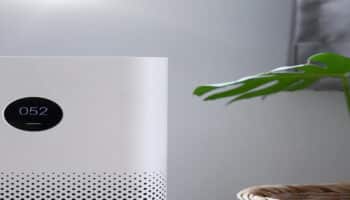There’s something wrong with the air.
You can feel it. You can feel yourself getting frequently irritated. Is that sore throat due to allergies or dry air?
Now that you think about it, hasn’t the air been feeling a bit uncomfortable for a while now?
What’s going on?
Poor air quality in our homes will always cause irritation. Whether that’s dry air that’s affecting your eyes and throat, or allergens causing irritation reactions – it’s torture not being comfortable in our own home. That’s where air purifiers and humidifiers come in.
Air purifiers and humidifiers are both excellent appliances that can really improve the air quality in your home. But which is best, and which suits your needs?
In short, air purifiers are best for allergy sufferers and those with pets. On the other hand, humidifiers will solve dry air issues like a sore throat. In the article below, you’ll find a clear comparison between both appliances based on several factors. Hopefully, by the end of it, you’ll have a much clearer idea of where things stand.
Are you ready? Let’s dive in!
Air Purifiers vs Humidifiers – Quick Answer
As one of our (super-smart and good-looking) readers, I know you’ve got plenty on your schedule. So here’s a brief summary of the answer to Air Purifiers vs Humidifiers.
These are different tools that solve different problems.
Air purifiers remove irritants from the air, whereas humidifiers soothe dry air by adding moisture to it.
The best way to know which will help most is based on the symptoms you’re seeing. I’ve summarized these in the table below.
| Air Purifiers Help With: | Humidifiers Help With: |
|---|---|
| Allergies | Irritated Throat |
| Dustiness | Irritated Sinuses |
| Asthma Issues | Asthma Issues |
| Bad Odors | Headaches |
| Smoke Issues | Tiredness |
If you need cleaner air, get an air purifier. If you’re suffering from dry air, get a humidifier. Can you use both at the same time? Of course!
Want to know more? Read on for an in-depth review and comparison of both options.
Comparing Air Purifiers vs Dehumidifiers
As I mentioned above, the appliance that’s going to help you the most will depend on your situation. To help, I’ve outlined the answer for each of the most common symptoms or scenarios below.
Dry Throat
If your throat’s been dry, and you’re wondering which appliance to get – a humidifier will likely be of much more help to you. Dry air can get really irritable, especially in our noses and throats. An air purifier could help if you think this could be to pollutants in the air or allergies, but otherwise, a humidifier would be your best bet.
Sinus Issues
While there can be many causes of sinus issues, humidifiers are a known solution when aggravated sinuses are brought on over winter.
Dry air can dry out our sinuses, which (delightfully) causes issues with mucus production. This can then cause dry throat, nose, and mouth too (sound familiar?). A humidifier will replenish the relative humidity in the air, which will help our lovely nose systems to function as they should. Air purifiers may somewhat help mitigate the irritation, but ultimately a humidifier will likely help your sinuses the most.
Best for a Baby
Although I’m an engineer, I’m no doctor – and I don’t want to play one on the internet. If your child is having issues, it’s far better to ask a doctor and not rely on Google!
If you must find a quick solution, then consider the other symptoms on this list. If your baby’s getting very congested, it’s a common solution to up the humidity in the air. Traditionally the solution is to nurse them in the bathroom with a ton of steam from a hot bath filling the air. A humidifier will help in the same way.
Asthma
Asthma can be brought on by both allergies/irritants and dry air. An air purifier will help with the first two, and a humidifier will help with dry air. In particular, dry air in winter aggravates asthma as it causes the natural fluids in your airways to evaporate quicker.
Any asthmatics who’ve gone for a run in cold weather can tell you just how bad it can be.
If asthma symptoms have started to appear as the temperatures gotten cooler – it’s likely due to dry air. Pick up a humidifier, and it should help. If you think it may be aggravated by allergens (i.e., pets, hay fever, or dust/mold), an air purifier may help with these.
Eczema
Eczema is brought on by the dryness of your skin, which is hugely exacerbated by dry air. A humidifier is the best option to help keep the air in your space sufficiently ‘wet’, and make sure that your skin doesn’t lose its moisture.
Dust
A build-up of dust is common on the approach to winter. We’re digging into old cupboards, firing up unused heating systems, and keeping windows locked. Air purifiers are a great help in handling this and keeping your air clean. It’s one of the functions they specialize in.
Cough
An irritating cough is typically brought on by dry air causing havoc with the regular function of your respiratory system. Your throat is likely to dry out as the moisture in it evaporates, with irritation quickly following. A humidifier can be a great help with this, as well as making sure you stay hydrated.
Allergies & Hayfever
Allergies can be horrible to deal with, especially inside your own home. Air purifiers will quietly take care of the pollutants in the air that start allergic reactions. Pet dander, pollen, dust, and even mold will get removed by a quality, True HEPA air purifier.
Snoring
Similar to other respiratory issues, snoring can be exacerbated by dry air – which can dry out your throat, and nose, causing congestion. These can cause your passages to swell up, which aggravates any snoring you (and your partner) have to suffer through. A humidifier will help replenish the moisture in the air – keeping your respiratory system nice and lubricated for better airflow.
Air Purifiers & Humidifiers: An General Overview
What Does An Air Purifier Do?
While we spend 90% of our time indoors, the air in our homes can be home to plenty of irritants. Some common examples:
- Dust
- Mold
- Smoke
- Pet Dander
- & Other Allergens (Pollen)
There’s no time in the year that these are worse than in winter. Our windows stay closed, we’re pulling winter jumpers out of old cupboards, and we’re starting up dusty heating systems. As a result, we can suffer from asthma symptoms, allergy discomfort, plain old bad odors, or even just dusty furniture!
Air Purifiers are made to solve this.
They ‘purify’ the air trapping and holding on to the irritants. This is either done using filters, or an electrostatic trap that charges the particle and causes them to stick to a filter – like a magnet. There’s nothing more to them than that.
For best results, make sure to find one with a HEPA (High-Efficiency Particular Air) filter. These are the finest filters with super-thin fiberglass threads. They capture all sizes of particles down to 0.3 microns due to the zigzag pattern of the threads eventually connecting and sticking the particle.
Tip: You want to look for ‘True HEPA’ in the name. Any other mention of HEPA doesn’t guarantee they meet the high standards to be certified (blocking 99.7% of particles down to 0.3 mirons; which is 0.003 millimeters!). Make sure it’s exactly ‘True HEPA’.
What does a Humidifier Do?
No big explanation is needed here – humidifiers simply add moisture to the air. This increases the relative humidity of the air we’re breathing, which will stop the irritations that dry air causes. Including:
- Sore throats
- Headaches
- Dry Sinuses
- Dry Skin / Cracked Lips
- Even catalyzing respiratory issues
What Causes Dry Air In A House?
You may have heard that warm air can ‘hold’ more water than cold air. Let me explain fully:
Water in the air is made up of tiny molecules. These zip around, and get faster when the temperature is warmer, and slower when it’s colder. When it’s too cold, they will condense back into liquid water.
Naturally, warm air tends to have a lot more of these water molecules zipping around because they’re moving too fast to become liquid. On the other hand, cold air has a lot less, since much of the water molecules turn back into a liquid.
When we take cool air inside our homes and heat it, this warm air feels ‘dry’ because it’s got no new water molecules in it. We take a small quantity of water from cool air, and heat it up. So while normal warm air has a ton of water, air that’s been heated doesn’t. This is why it gets super dry. And this is what a humidifier solves.
Tips for Improving Air Quality.
While technology can be a great help in solving our problems, sometimes the best solutions are things we can do ourselves.
Here’s a few tips to improve the air quality in your home without spending money on an appliance. Make sure to use these to make the most of (or instead of) an air-quality product.
- When you can, keep windows open for good airflow. This isn’t easy to do when it’s cold out, but even 15 minutes in the morning or mid-afternoon can help flush out pollutants. While some allergies come from outdoors, indoor air has 2-5x more irritants in it!
- Try to keep tidy. I’m not saying be a neatfreak, but regularly vacuuming and dusting will help so much in keeping your air dust free.
- Use a sealed, HEPA-certified vacuum. Cheaper ones often cough up a lot of small particles back into the air from within their own containers.
- Keep a handle on regular maintenance and filter changing on your HVAC systems.
- Be smart with your exhaust fans. Before cooking up a storm in the kitchen (or doing the opposite in the bathroom), put the exhaust fan on for a few minutes before you start and keep it on for a while afterwards.
- If you’re using an air purifier or humidifier, keep the clean! Replace or wash out old filters and clean your humidifier’s tank around once a month or so. Don’t prevent them making clean air before they even begin!
- Lastly, be mindful about how you’re producing irritants day-to-day. Have furry pets? Consider keeping them out of at least one room to preserve one good clean space. Avoid making smoke either on purpose (cigarettes, candles, or even fires) or accidentally (burning toast or overgrilling the bacon!)
Conclusion
The quality of air we breathe is a huge part of how comfortable we feel. While it’s often not even considered, it’s a key comfort factor that doesn’t take much effort to make the most out of.
I hope this guide has helped you understand what air purifiers and humidifiers do, what issues they can help you solve, and a few other tips about being air-quality conscious.
If this article’s helped you, please consider supporting us by joining our e-mail list or just checking out some more articles!
We’re a small blog and appreciate everyone who reads our content.
Thank you, and have a great day!
—Craig.
Frequently Asked Questions
What Size Humidifier Do I Need?
The general rule is to choose a humidifier with a capacity of 10 pints (4.73 l) per day for the first 500 square feet (ca. 46 m²) you want to improve air quality on and then add 4 pints (1.89 l) for every additional 500 square feet (ca. 46 m²).
So, for a 1500 square feet (ca. 139 m²) room, you’ll need a humidifier with a capacity of 18 pints (8.52 l) per day.
Can a Humidifier Make the Air Too Humid?
Absolutely.
While this appliance can provide many benefits for you and your family, overusing it or using it incorrectly can cause some issues.
If you already have an area with high levels of humidity, adding a humidifier on top of that can make the air excessively humid, increasing the risk of dampness and mold appearing in your home.
Are Air Purifiers Noisy?
The short answer is yes.
Like any other air-related appliance, there will be sound created when air is blown out of a unit or sucked in by it. However, there are some models out there with designs that prevent excessive noise.
So, if you’re worried an air purifier will keep you up at night, try looking for one that is certified for quiet operation.







